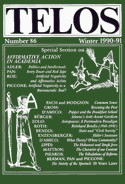As Popper has written in several articles and his autobiography, he encountered Marxism as a young man in Austria around 1919. For two or three months he called himself a communist, but soon turned against the doctrine after the deaths of pro-communist demonstrators was justified with what Popper considered pseudo-scientific jargon. These events made him a fallibilist acutely aware of the distinction between dogmatic and critical thinking. (34)
 This emotionally powerful and philosophically significant experience colored Popper’s views of Marxism, the call for revolutionary social change, and the utopianism that foments it. In light of this, it is not difficult to see why Popper and (in particular early) Critical Theorists might have found much about which to disagree. Robert D’Amico discusses myriad points of contrast between Karl Popper and the Frankfurt School, though from the outset he acknowledges that the “infamous ‘methodology dispute’ in German sociology that occurred primarily between Popper and Adorno . . . is best described as a misfire” (33). Despite this alleged “misfire,” D’Amico’s analysis raises profound questions that continue to gain attention and prod ongoing debate in terms of the philosophy, theory, and methodology of the social sciences.
This emotionally powerful and philosophically significant experience colored Popper’s views of Marxism, the call for revolutionary social change, and the utopianism that foments it. In light of this, it is not difficult to see why Popper and (in particular early) Critical Theorists might have found much about which to disagree. Robert D’Amico discusses myriad points of contrast between Karl Popper and the Frankfurt School, though from the outset he acknowledges that the “infamous ‘methodology dispute’ in German sociology that occurred primarily between Popper and Adorno . . . is best described as a misfire” (33). Despite this alleged “misfire,” D’Amico’s analysis raises profound questions that continue to gain attention and prod ongoing debate in terms of the philosophy, theory, and methodology of the social sciences.







